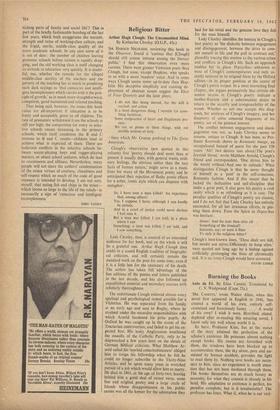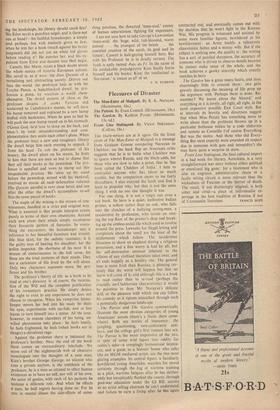Burning the Books
Auto da Fe. By Elias Canetti. Translated by C. V. Wedgwood. (Cape, 21s.) 'Ma. CarvErri,' wrote Walter Allen, when this novel first appeared in English in 1946, 'has created a world of his own, entirely self- contained and ferociously funny. . . .' A world of his own? I wish it were. Horrified, elated, depleted after re-reading this amazing novel, I knoW only too well whose world it is.
Its hero, Professor Kien, has at the outset of the story attained the perfection of the scholar's existence. He possesses almost nothing except books. His rooms are furnished with them, the windows have been blocked up to accommodate them, the sky alone, pure and un- stained by human accident, provides the light to read them by. Nothing save books are neces- sary to him, since no experience is worth atten- tion that has not been mediated through them. The books themselves are as much luxury as necessity, for what they contain is already in his head. His adaptation to existence is perfect, his paradise complete; but is it invulnerable? The professor has fears. What if, when he is out visit-
ing the bookshops, his library should catch fire? His Eden needs a guardian angel; and is there not one at hand?—his faithful housekeeper, a simple soul perhaps, but with instincts given to few; when he lent her a book (much against his better judgment) did she not put on white kid gloves before reading it? He marries her, and his ex- pulsion from Eden and descent into Hell begin.
Canetti, like Mann, raises a black doubt about the whole nature of historic European culture. His novel is. as it were. the Don Quixote of a verbalising and abstracting society. Driven out into the world the professor tails in with his Sancho Panza, a hunchbacked dwarf, by pro- fession a pimp, by vocation a. world chess- champion. The dwarf dreams of chess as the professor dreams of 000ks Famous and acclaimed as Capablanca's master, he will have his hump removed and replaced by a new hump stuffed with banknotes. When he goes to bed he will push the new hump round on to his stomach. ('Great God, he'd love to sleep on his back, just once.') In total misunderstanding and com- plementation they assist each other's plans. When the professor buys a new and imaginary library the dwarf helps him each evening to unpack it from his head To rob the professor of his money, the dwarf plays on his mania, he hints to him that there are men so lost to shame that they sell their books at the pawnshop. The pro- fessor is appalled and vows to stamp out this unspeakable practice. He takes up his stand before the pawnshop, armed with his bankroll, resolved to rescue all such defenceless volume§ (the Quixote parallel is very close here), and one after the other the dwarf's accomplices re-sell him the same parcel of books The staple of the writing is the stream of con- sciousness, handled in a strict and original way. What is assumed is that people interpret events purely in terms of their own obsessions. Around each new event their minds simply recompose their favourite pattern of fantasies. In every- thing she encounters, the housekeeper sees a reference to her beautiful furniture and irresist- ible blue skirt, for the sadistic caretaker, it is the guilty joys of beating his daughter; for the police inspector. the shortness of his nose It is stream of consciousness in the full sense, for these are the total contents of their minds. They are a caricature of life lived by the will alone. Only two characters represent more, the pro- fessor and his brother.
The professor's theory of life, as a book to be read at one's pleasure. is of course, the incarna- tion of the Will and the complete justification of his tormentors practice. He simply denies the right to exist to any experience he does not choose to recognise. When his vampirine house- keeper moves her bed into his study he shuts his eyes, experiments with ear-lids, and at last learns to turn himself into a statue. All the time, however, in remote chambers of his being, un- willed phenomena take place: he feels lonely, he feels frightened, he feels (when books are in danger) a chivalrous rage.
Against the professor there is balanced the professor's brother. Near the end of the book there comes an extraordinary interlude. We move out of the nightmarish web of obsessive monologues into the thoughts of a sane man, Kien's brother George. George, an alienist who runs a private asylum, is the antithesis of the professor, he is a man so attuned to other human existences as to have no self, nor will of his own. An actor of genius, with each of his patients he sustains a different role. And when he effects a cure, he half regrets having done so. For he sees in mental illness the side-effects of soine-
thing precious, the thwarted 'mass-soul,' enemy of human separateness, fighting for expression. I am not sure how to take George's Lawrentian 'mass-soul,' the 'huge, wild, full-blooded, warm
animal . . the youngest of the beasts . . the essential creation of the earth, its goal and its future'; Canetti is halt-guying himself here. But with his Professor he is in deadly earnest. The book is aptly named Auto do Fe. In the name of his unshakable prejudgments Kien finally burns himself and his books; Kien, the intellectual as `fire-raiser,' is meant as all of us.
P. N. FURSANK


































 Previous page
Previous page